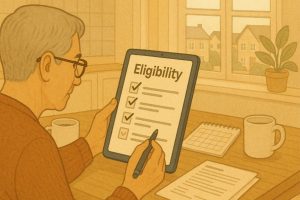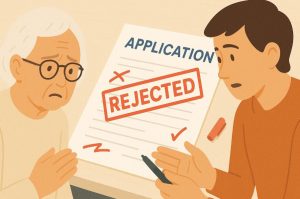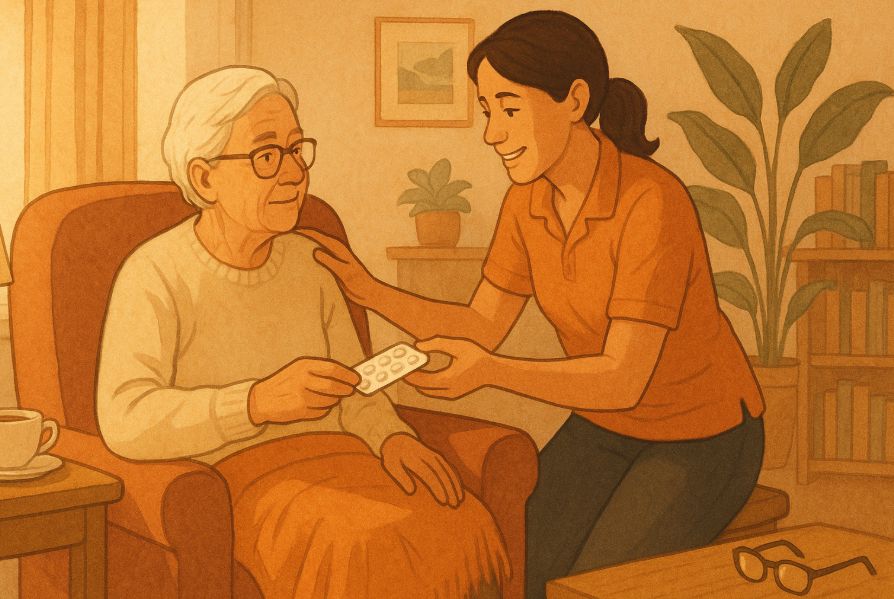Understanding which medical conditions qualify for Attendance Allowance can be confusing, especially as we enter 2025 with evolving health needs and policies. Many older adults across the UK are unaware that their long-term physical or mental health conditions could make them eligible for this crucial, non-means-tested benefit.
Attendance Allowance is designed to support people over State Pension age who require assistance with daily personal care or supervision due to illness or disability.This comprehensive guide breaks down exactly what conditions typically qualify, how eligibility is assessed, what the latest 2025 rates are, and how to apply successfully.
Whether you’re exploring this for yourself, a family member, or someone you care for, this article will provide the real-world insights and clarity you need to navigate the process confidently.
What is Attendance Allowance and Who Can Apply for It?

Attendance Allowance is a UK government benefit designed to provide financial support for individuals aged State Pension age or older who have a disability or health condition that requires assistance with personal care or supervision. This benefit is not means-tested, which means it is not affected by income, savings, or employment status.
Unlike Personal Independence Payment (PIP), Attendance Allowance is specifically for older adults, often to help them maintain independence at home. The support provided helps with tasks such as getting dressed, eating, bathing, taking medication, or staying safe throughout the day and night.
An important feature of this benefit is that you do not need to have a formal carer. The need for care or supervision itself is what determines eligibility, regardless of whether help is currently being received.
What Conditions Typically Qualify for Attendance Allowance in 2025?
Attendance Allowance does not use a fixed list of eligible conditions. Instead, the assessment focuses on the impact of the condition on the individual’s daily life and care needs. However, the following categories broadly reflect the types of medical conditions that often lead to a successful claim:
| Condition Type | Common Conditions |
| Mobility Impairments | Arthritis, osteoporosis, hip or knee replacements, spinal disorders |
| Neurological Disorders | Parkinson’s disease, stroke aftereffects, multiple sclerosis, motor neurone disease |
| Cardiovascular Issues | Heart failure, angina, severe hypertension, peripheral artery disease |
| Respiratory Conditions | Chronic obstructive pulmonary disease (COPD), severe asthma, pulmonary fibrosis |
| Sensory Impairments | Severe visual impairment, hearing loss, balance disorders |
| Mental Health Conditions | Alzheimer’s disease, dementia, schizophrenia, severe depression, bipolar disorder |
| Chronic Conditions | Diabetes with complications, chronic fatigue syndrome, fibromyalgia |
| Terminal Illnesses | Advanced cancer, organ failure, palliative-stage conditions |
It is the resulting care needs, not the diagnosis itself, that determine eligibility.
Does Having a Diagnosis Guarantee Attendance Allowance?
A diagnos helpful for context, does not automatically entitle someone to receive Attendance Allowance. The Department for Work and Pensions (DWP) will assess how the condition affects your ability to manage daily life independently.
For example, two people with the same condition, such as arthritis, might have very different care needs. One person may need only mild assistance occasionally, while another may be unable to perform basic tasks without constant help. In this scenario, only the individual with substantial care requirements is likely to qualify.is, while
What Are the Eligibility Rules for Attendance Allowance in 2025?

Eligibility for Attendance Allowance in 2025 is based on a combination of age, residency, and the physical or mental impact of a condition. The current rules are as follows:
| Eligibility Requirement | Details |
| Age | Must be State Pension age or older (currently 66 in the UK) |
| Residency | Must be living in Great Britain and have been in the UK for 2 of the last 3 years |
| Health Condition | Must have a condition that affects daily living or safety |
| Care Needs | Must need help with personal care or supervision |
| Duration of Need | Condition must have existed for at least 6 months unless terminal |
| Terminal Illness Rule | No waiting period; fast-track process for those expected to live less than 12 months |
How Do Physical Disabilities Impact Attendance Allowance Claims?
Physical disabilities can significantly affect a person’s ability to manage daily life, and Attendance Allowance recognises the support required in such situations. The benefit is awarded based on how a condition impacts care needs not just the diagnosis.
Mobility Limitations
Conditions like arthritis, joint replacements, or spinal issues may restrict movement, making it difficult to get out of bed, climb stairs, or walk safely. If help is needed to move around or prevent falls, this may support a claim.
Struggles with Personal Care
Many physical conditions make tasks like dressing, bathing, or toileting difficult. If someone requires hands-on help or can’t manage these activities safely alone, they may meet the care need criteria.
Fatigue and Chronic Pain
Ongoing pain or tiredness caused by conditions such as fibromyalgia or Parkinson’s can make even simple tasks exhausting. The DWP considers how these symptoms limit daily functioning.
Need for Supervision
Frequent falls or unsteadiness may create a need for regular supervision to avoid injury. Even if no one is currently providing that support, the need itself can qualify.
Can Mental Health Conditions Qualify for Attendance Allowance?
Yes, mental health conditions can qualify for Attendance Allowance if they lead to a need for personal care, supervision, or regular support. The DWP considers how the condition affects daily life, rather than the diagnosis alone.
Impact on Daily Living and Safety
Mental health issues such as Alzheimer’s disease, depression, or anxiety can interfere with essential daily activities. Individuals may struggle with personal hygiene, forget to take medication, or be at risk without supervision all of which are considered valid care needs.
Examples of Qualifying Conditions
-
Someone with Alzheimer’s disease may experience memory loss and confusion, leading to unsafe behaviours like leaving appliances on or missing meals.
-
A person with severe depression might remain in bed for long periods, needing encouragement to eat or wash.
-
Individuals with anxiety disorders may avoid tasks due to panic, needing emotional support to function.
The Importance of Supporting Evidence
To support a claim, it’s crucial to provide evidence of how the condition affects daily life. This might include GP letters, mental health assessments, or statements from carers. The DWP must clearly see the link between the mental health condition and the applicant’s need for care or supervision.
Do Terminal Illnesses Automatically Qualify for Attendance Allowance?

Terminal illness cases are treated with urgency and compassion. The Special Rules for End of Life (SREL) allow individuals who are expected to live less than 12 months to receive Attendance Allowance without the usual six-month qualifying period.
To apply, a doctor or nurse submits a DS1500 form confirming the diagnosis. Once received, the DWP typically processes these claims quickly, and the higher rate of Attendance Allowance is awarded automatically.
This ensures individuals in palliative care receive financial support without delays.
How Does the Dwp Assess Care Needs for Attendance Allowance?
The assessment process does not focus on what condition you have, but rather on how that condition limits your ability to care for yourself or stay safe. The following types of care are evaluated:
| Type of Need | Examples |
| Personal Care | Help with dressing, washing, eating, or going to the toilet |
| Medication Management | Reminders, preparation of medicines, managing side effects |
| Supervision for Safety | Risk of falls, confusion, wandering, seizures |
| Mental Health Support | Emotional encouragement, calming panic or agitation |
| Night-time Needs | Getting up for toilet visits, assistance with medical equipment |
Even if no one is currently providing this care, the need itself is enough to qualify provided it is documented effectively on the claim form.
How Can Someone Apply for Attendance Allowance in 2025?
Applying for Attendance Allowance involves completing a detailed paper application form, which must be requested from the DWP or downloaded from GOV.UK. Here’s a breakdown of the steps:
| Step | Action |
| 1 | Request the form by calling 0800 731 0122 or downloading it from the GOV.UK website |
| 2 | Complete the form carefully, providing specific examples of how your condition affects you |
| 3 | Include supporting evidence such as letters from doctors, care providers, or carers |
| 4 | Post the form to: Freepost DWP Attendance Allowance |
| 5 | Wait for a decision, which typically takes 6 to 8 weeks unless claiming under special rules |
Accuracy and detail are key. Claims that provide real-life examples such as needing help getting out of the bath or needing supervision to avoid falls tend to be more successful.
What Are the Attendance Allowance Rates for 2025?

From April 2025, Attendance Allowance payments are made at two rates, depending on the level of care needed:
| Rate Type | Weekly Payment | Who Gets It |
| Lower Rate | £72.65 | For those needing help during the day or night |
| Higher Rate | £108.55 | For those needing help during the day and night, or terminally ill |
The payments are made every four weeks and are tax-free. They are not affected by income or savings.
What Other Benefits Might Attendance Allowance Affect?
Receiving Attendance Allowance can act as a gateway to additional financial help, especially if you’re on a low income. While Attendance Allowance itself doesn’t affect your savings or income, it may lead to increased eligibility for:
| Benefit | How It’s Affected |
| Pension Credit | May increase due to severe disability premium |
| Housing Benefit | Possible increase if AA is awarded |
| Council Tax Reduction | Often granted to those receiving Attendance Allowance |
| Carer’s Allowance | A carer may claim this if they provide at least 35 hours/week care |
These additional benefits are not automatic, so it’s worth speaking to a benefits adviser or using a calculator like the one on Turn2Us.
What Common Mistakes Lead to Claim Denials?

Incomplete or Vague Application Forms
One of the most frequent reasons for a denial is missing information or answers that lack detail. The DWP requires a clear understanding of how the applicant’s condition affects their day-to-day life. If sections are left blank or responses are too general such as saying “I need help with washing” without explaining why or how often the application may be dismissed.
Underestimating or Downplaying Care Needs
Many people, particularly older adults, are modest about their struggles. They may avoid fully describing how much help they actually need out of pride or habit. Unfortunately, this can work against them. The DWP relies on detailed evidence to assess the level of care required. Failing to mention difficulties during the night or omitting supervision needs can result in being awarded the lower rate or nothing at all.
Lack of Supporting Medical Evidence
Although a diagnosis alone doesn’t guarantee eligibility, it’s still crucial to provide medical context. If the form is submitted without any GP letters, consultant notes, prescription records, or care documentation, the DWP may not have enough confidence in the claim to approve it.
Not Highlighting Night-time Needs
Applicants often focus only on daytime difficulties. However, Attendance Allowance has a higher rate for those who need help during both the day and night. Forgetting to explain issues like needing assistance to use the toilet at night, frequent waking due to pain, or requiring supervision for safety during the night can lead to receiving only the lower rate.
Using Someone Else’s Words or a Generic Format
While it’s okay to get help filling out the form, it’s important that the answers reflect the claimant’s unique experiences. Using a copied template or overly polished language can make it difficult for assessors to see the personal struggles of the individual.
Failure to Report Worsening Conditions
If an individual’s health has deteriorated since the last application but they don’t update the DWP, the claim might be assessed based on outdated information. If a previous claim was denied, reapplying with no significant updates or changes may lead to another rejection.
Ignoring the Appeal or Reconsideration Process
Some applicants give up too early. A rejection isn’t the end claimants can ask for a mandatory reconsideration and, if needed, appeal to an independent tribunal. Many appeals are successful because they provide further detail or new evidence that strengthens the case.
Conclusion
Anyone over State Pension age who requires support with personal care, supervision, or safety due to a long-term condition should consider applying. Attendance Allowance is not limited to those with visible or severe conditions many people with chronic pain, fatigue, mental health conditions, or hidden disabilities are also eligible.
If you or someone you care for struggles with daily tasks due to age, illness, or disability, this benefit can make a meaningful difference.
Frequently Asked Questions about Attendance Allowance
Can you apply for Attendance Allowance on behalf of someone else?
Yes. Family members or carers can complete the form, and legal authority (like Power of Attorney) may be needed in some cases.
Is Attendance Allowance taxed?
No. It is a tax-free benefit and doesn’t count as income for most other benefit calculations.
How long does a claim decision take?
On average, 6–8 weeks. Terminal illness claims are usually processed within 2 weeks.
Can people with hidden conditions qualify?
Yes. Conditions like fibromyalgia, chronic fatigue, or mental health disorders can qualify if they impact care needs.
Does Attendance Allowance affect other benefits?
It can increase entitlements like Pension Credit or Housing Benefit but does not reduce any benefits.
What happens if your condition changes?
You should inform the DWP if your care needs increase or decrease. A reassessment may be carried out.
Is there a reassessment process?
Unlike PIP, Attendance Allowance is often awarded indefinitely or long-term, especially for older people, but DWP may review your case if your situation changes significantly.









Leave feedback about this